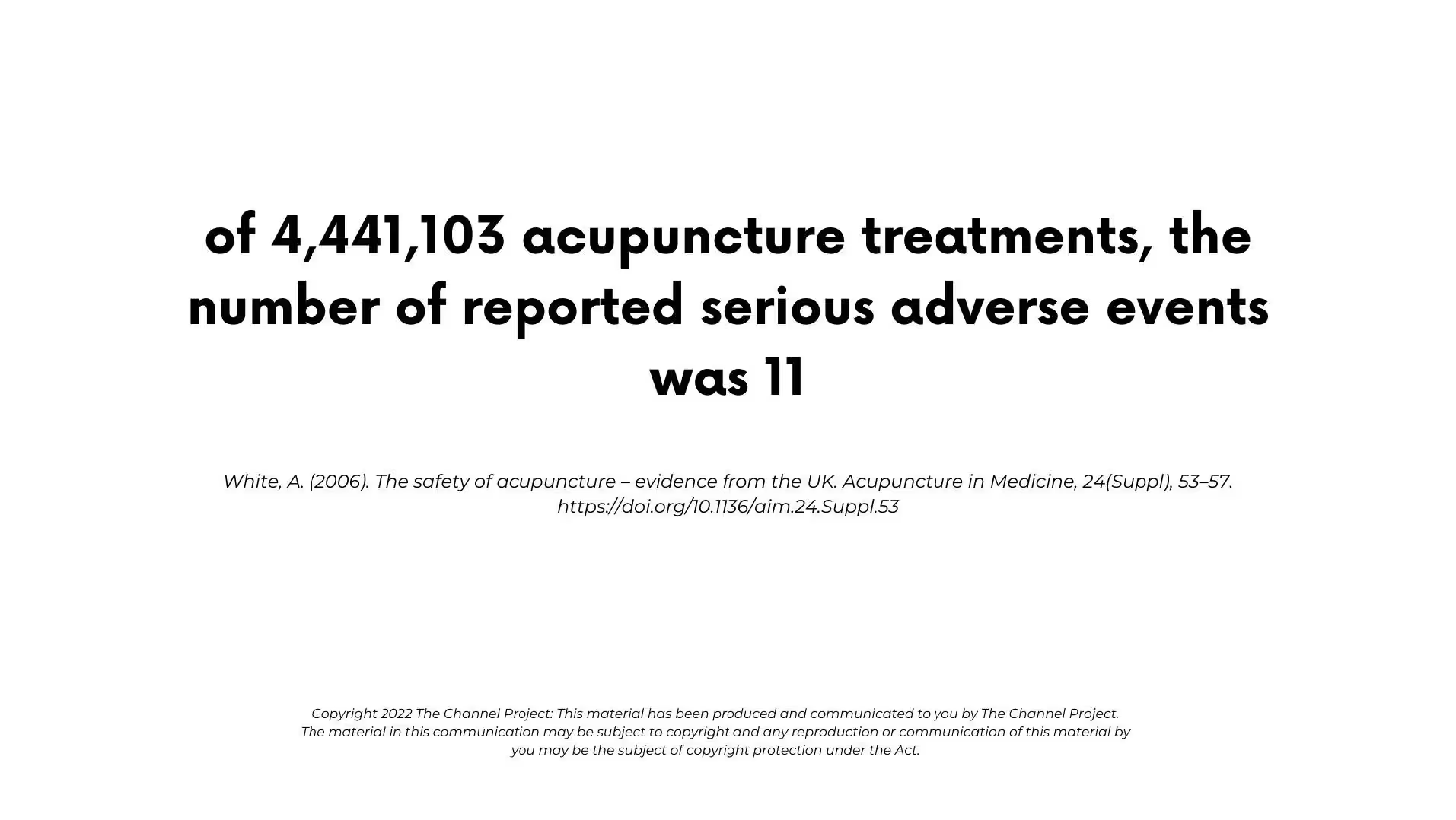In guidance published by the National Institute for Care and Excellence (NICE) in 2021, acupuncture is now considered an effective treatment for chronic primary pain. And the reason NICE now recommends it is because the evidence is so vast for its efficacy.
Cochrane, which is considered the gold standard of research, currently has almost 15,000 controlled trials for acupuncture. Physiotherapy has 12,000, and chiropractors have just over 1,000.


So let us take a look at what that evidence says.
In the largest study of chronic pain and acupuncture, 454,920 patients who had lower back pain or osteoarthritis or headaches received acupuncture. They found that:
“Acupuncture proved a highly demanded treatment option for chronic pain conditions within the German research program. Results indicate that acupuncture provided by qualified therapists is safe, and patients benefited from the treatment”
A 2012 study of 17,922 patients with chronic pain conditions such as lower back pain or osteoarthritis or neck pain or headaches found that:
Acupuncture is effective for the treatment of chronic pain and is therefore a reasonable referral option. Significant differences between true and sham acupuncture indicate that acupuncture is more than a placebo
And it isn’t just muscular joint pain. In 2022 a study they found that acupuncture could be beneficial for cancer pain:
"We proposed the first evidence-based guideline recommendations for the management of cancer patients with moderate to severe pain. This guideline will benefit patients with cancer pain using acupuncture treatment. Dissemination and implementation of this guideline are integral components."
Or even period pain, known as dysmenorrhea:
"Acupuncture treatment reduced menstrual pain intensity and duration after three months of treatment and this was sustained for up to one year after trial entry."

And the true beauty of acupuncture?
Acupuncture isn’t just effective for pain. Here are three other conditions that acupuncture might support your health.
- Allergic rhinitis: in a 2020 study of 3433 participants, they found that acupuncture methods are safe and effective for allergic rhinitis.
- Menopause: acupuncture might be useful for hot flashes, trouble with sleep, cognitive decline and osteoporosis.
- Anxiety: a 2016 systematic review of 400 patients found that: “the results show that the effects from acupuncture for treating anxiety have been shown to be significant as compared to conventional treatments”
Will acupuncture help me?
All those studies above are all evidence-based. They indicate strongly that acupuncture is effective for these conditions.
But acupuncture isn’t a miracle. Otherwise acupuncturists would be gods. They are not. They are practitioners and this is a medicine.
The evidence is very positive, especially for those conditions mentioned above, but it isn’t always a silver bullet and an acupuncture treatment is a partnership between practitioner and patient. You may be required to look at lifestyle changes to enhance the treatment. Also the longer you have had a problem, the longer it may take to see complete change.

Is acupuncture safe?
The most commonly asked question is “is acupuncture safe”. And it is a brilliant and very important question.
ALL medicine has inherent dangers. We need only look at the opioid crisis to understand that even medication has very serious side effects.
In a 2006 study of serious adverse events in acupuncture they found that of 4,441,103 acupuncture treatments, there were 11 reported serious adverse events. This is not to diminish those 11. In an ideal world this would be 0.
But to be put into context medical error is the 3rd leading cause of death in the US.


My six top tips for finding the right acupuncturist for you:
- Check out the British Acupuncture Council. They and their registered practitioners are part of the Professional Standards Authority. This means they have at least 3 years of degree level training, are bound by codes of safety and ethics, all have to complete a minimum number of hours continued professional development and are properly insured.
- Know the difference between acupuncture and dry needling. Acupuncture is done by acupuncturists. Dry needling is done by physios, and chiropractors and the reason they borrow these techniques is that they work. But whilst they might help with your pain, can they help with your sleep or your mental health or your menopause?
- Speak to a few practitioners. Find the practitioner that is the right fit for you and your main complaint.
- The earlier you can get treatment the better the success rate. Acute injuries will take less time to treat!
- Get in touch with your health insurance. They may well cover some of your appointments for you. Related guide: Best private health insurance policies in the UK.
- Give it more than one go. Acupuncture is not a miracle treatment. All medicines take time, acupuncture is no different.

About Andrea
Andrea Dewhurst is a mobile acupuncturist in Hertfordshire and Central Bedfordshire. She is a member of the British Acupuncture Council and Evidence Based Acupuncture.
Bringing the acupuncture to you she offers mobile acupuncture across Hertfordshire and Central Bedfordshire, saving you precious time and allowing you to keep healing and relaxing after she has left.
As a 4,000 hour degree level qualified acupuncturist she specialises in pain relief working with musculoskeletal conditions but also headaches and menstrual pain.
If you have any questions at all Andrea can be contacted at
Website: https://www.thechannelproject.co.uk/
Email: [email protected]




